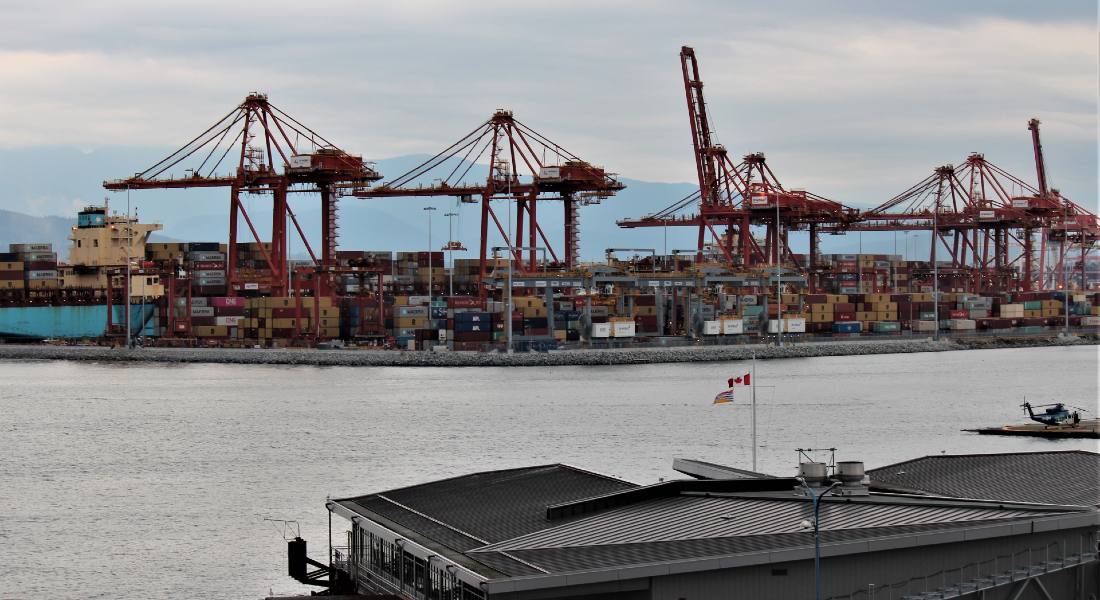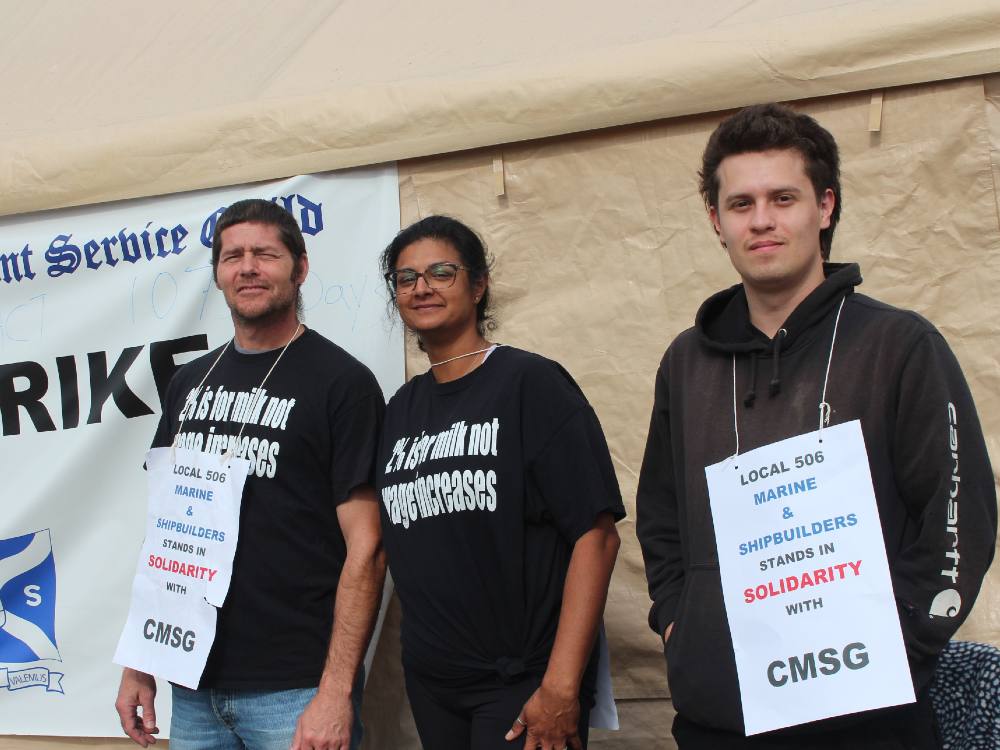Nearly 1,000 employees in North Vancouver’s docks are off the job as a battle between tugboat operators and their employer paralyzes one of the country's largest ship-building operations.
The federal government has stepped in to try and resolve a dispute between Seaspan and 165 striking tugboat staff, who have been joined at picket lines by other unions at the maritime monolith’s North Vancouver shipyard and drydock.
The vast majority of those workers are not on strike themselves but have refused to report to work in solidarity with tugboat captains and engineers at the Canadian Merchant Service Guild, who declared an impasse at the bargaining table in late August.
Since then, the company has gone to the BC Labour Relations Board and the B.C. Supreme Court in an effort to have the picket declared illegal, without any success. The result is that work at the shipyards, where employees were completing billion-dollar contracts for the Royal Canadian Navy and the Canadian Coast Guard, has ground to a halt.
So while other tugboat firms have largely taken up the slack by the striking operators for Seaspan, it’s the company’s ship-building arm that’s taking the big hit from the job action.
For weeks, neither the company nor the guild spoke publicly about exactly what went wrong at the bargaining table. The Tyee has learned the parties could not reconcile differences on wages, a new shift scheduling system and safety concerns, festering into a dispute that now affects roughly 1,000 staff and one of the largest shipbuilding and tugboat operations in the province.
“It’s not the resolution that we want,” Seaspan communications director Ali Hounsell said. “It’s not where we want to be. It’s not where anyone would prefer to be.”
Trouble on the waterfront
There is no normal day for a tugboat crew.
Seaspan’s 30 boats haul cruise ships to harbour. They transport massive shipments of chemicals and oil. They are the worker ants of Vancouver’s port, a vital link in Canada’s supply chain.
Seaspan, one of the Washington Companies, is nicknamed “the big red machine,” in part because its tugboat fleet is one of the largest and busiest in the harbour. The job takes years of training and experience and workers are in short supply.
Those workers’ last collective agreement with Seaspan expired three years ago. Negotiations began in early 2020 and were delayed because of the COVID-19 pandemic.
When they returned to the table, the differences would prove irreconcilable. Hounsell said the union’s offer is “way outside what they can afford” without making the business unsustainable.
“It is way outside of agreements we have had with our other Seaspan marine transportation units this year,” she said.
She said growing competition in the port means that accepting the union’s proposal could destroy the very jobs they are trying to protect and improve. “It is an offer that does not allow us to really have a sustainable future at all for the marine transportation business,” Hounsell said.
The Canadian Merchant Service Guild has not responded to multiple phone calls and emails sent since last Tuesday. Guild members told The Tyee the two parties originally agreed to not speak to media about the terms of the dispute.
But The Tyee has spoken to union members with knowledge of the negotiations who asked not to be identified, as well as communications that highlight a deep divide with the company’s position.
In a pamphlet distributed to members, the guild said Seaspan’s proposal would “offer wages far below industry standard and the current inflation levels” and would create changes to the work system that would “reduce staff, increase risk and increase operator fatigue.”
They also reference changes some union members fear could affect jobs and environmental safety.
Union members say Seaspan has proposed replacing engineers on tugboats with staff who have obtained a separate federal certificate. That’s legal, but union members have expressed concerns it could affect engineers’ jobs and increase risk of an environmental mishap, given those tugboats sometimes haul chemicals and oil along the province’s coast.
“We will always comply with Transport Canada regulations and requirements,” Seaspan spokeswoman Jessica Gares said. “Our proposal is fully compliant and allows us to make the business more sustainable and competitive.”
Enter the feds
Seaspan’s tugboat operations are federally regulated. In September, government mediators joined the parties to try and find a path back to the bargaining table.
“Last week, both sides did meet with someone from the federal team and unfortunately there was no progress as a result of that,” Hounsell said on Sept. 29.

The strike and picket have halted work on multiple massive federal contracts. The Vancouver Shipyards were completing one of two non-combat vessels they are building for the Canadian Navy, a contract valued in the billions, and a separate vessel for the Coast Guard.
A Department of National Defence spokeswoman told The Tyee they are not concerned with the delay.
“At this time, active vessel construction is not ongoing, however design and engineering work continues,” Canadian Coast Guard spokesman Barre Campbell wrote. “It would be premature to comment on any potential impacts to the vessel’s construction and current delivery timeline of 2025.”
Federal Labour Minister Seamus O’Regan’s spokesperson said he is watching the dispute closely. “We urge the parties to reach an agreement at the table,” Michelle Johnston wrote.
Hot dogs and uncertainty on the line
On a crisp Wednesday morning, Becky Lupton was spending another day on the picket line. Electricians, pipefitters and welders read books, chatted over coffee and downed hot dogs and burgers prepared at two separate grills. One passed around a hat, trying to raise money for pizza.
Most of these shipyard workers are not actually on strike but have refused to cross the picket line in solidarity with the guild.
Seaspan went to the BC Labour Relations Board arguing that constituted an illegal strike. But the board’s vice-chair, Stephanie Drake, dismissed that application.
“Respecting a picket line is fundamental to union solidarity and has long been recognized and enshrined in the Code as an exception to the definition of strike,” she wrote on Sept. 15.
The company then took the case to the B.C. Supreme Court, asking for an injunction that would prevent the tugboat workers from setting up picket lines. The North Shore News was first to report that Justice George MacIntosh dismissed that application last Tuesday.
The news was well-received on the picket line, where members of different union locals tossed around a frisbee and sipped from Tim Hortons coffee cups. Some wore T-shirts bearing the slogan: “2% is for milk, not wage increases.”
Seaspan estimates that roughly 900 employees have not appeared for work.
Hounsell said that has caused work at the shipyard to grind to a halt. She said it had also affected business at the drydock, which among other things does emergency repairs for some ships.
“We have to remember the impacts to the people here. This is 165 people who are impacting close to 900 people on the shipyard,” Hounsell said. “This isn’t their fight, this isn’t their strike.”
On Monday, Seaspan’s lawyers were back at the BC Labour Relations Board, asking them to reconsider their earlier decision that upheld the legality of the picket.
Lupton, a chair with the International Brotherhood of Electrical Workers Local 213, is hoping bargaining resumes so the picket can end. She blames the company for the delay and worries the wait is forcing some of her unionized colleagues to look for work elsewhere.
“We’re always hopeful the company would reach out and start negotiating again with CMSG,” Lupton said. “Ultimately, we’re honouring a picket line and we will continue to do so. But there are some realities that everybody faces after a certain period of time. I think a lot of people are looking at their tools and maybe finding other work.”
Paul Hilder is the president of the Council of Marine Carriers, which represents members of the tug and barge industry including Seaspan, where he was a vice-president until 2021.
Hilder says the acrimonious dispute comes amid contending forces for both parties at the bargaining table.
“There’s the outside pressures on the company, competition coming into the market and the high cost of doing business. And there’s the reality for the employee of living in B.C. and Vancouver in general with the current inflation and the cost of living. It’s tough on both sides,” Hilder said.
It’s not the first time the union and company have clashed. In 2014, the parties agreed to federal arbitration.
Hilder said arbitration, while an option, was never the ideal way to solve a dispute of this kind.
He noted Seaspan’s tugboat fleet is one of the largest in Vancouver’s docks. For now, he said, other tugboat companies could likely soak up the excess work. But he hopes everyone is back on the job soon.
“I hope the parties can get back to the table and come up with a negotiated settlement that’s fair to both sides rather than have one mandated on them, which is never good,” Hilder said. “No one comes out happy when that happens.” ![]()
Read more: Labour + Industry

















Tyee Commenting Guidelines
Comments that violate guidelines risk being deleted, and violations may result in a temporary or permanent user ban. Maintain the spirit of good conversation to stay in the discussion.
*Please note The Tyee is not a forum for spreading misinformation about COVID-19, denying its existence or minimizing its risk to public health.
Do:
Do not: